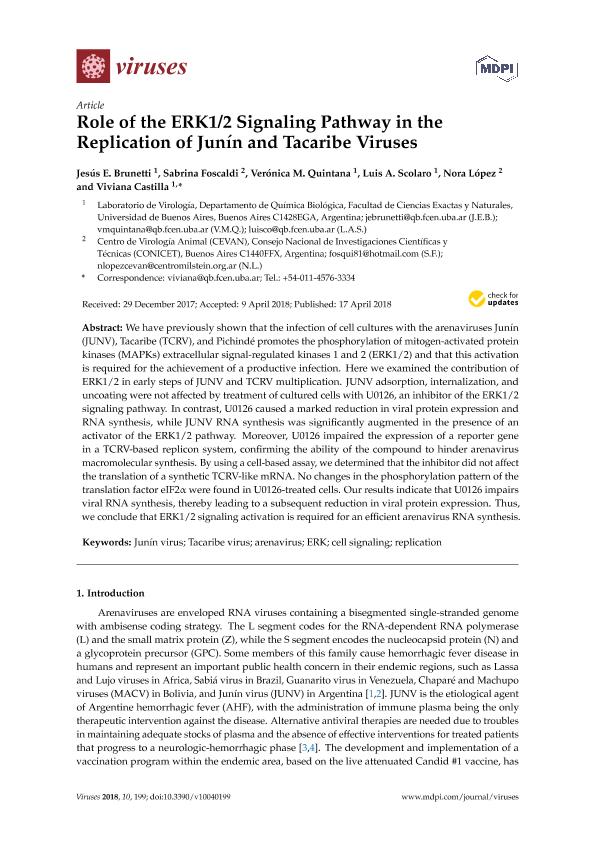Mostrar el registro sencillo del ítem
dc.contributor.author
Brunetti, Jesús Emanuel

dc.contributor.author
Foscaldi, Sabrina Andrea

dc.contributor.author
Quintana, Verónica Mara

dc.contributor.author
Scolaro, Luis Alberto

dc.contributor.author
Lopez, Nora Mabel

dc.contributor.author
Castilla, Viviana

dc.date.available
2020-03-12T19:53:33Z
dc.date.issued
2018-04
dc.identifier.citation
Brunetti, Jesús Emanuel; Foscaldi, Sabrina Andrea; Quintana, Verónica Mara; Scolaro, Luis Alberto; Lopez, Nora Mabel; et al.; Role of the ERK1/2 signaling pathway in the replication of junín and tacaribe viruses; MDPI; Viruses; 10; 4; 4-2018
dc.identifier.issn
1999-4915
dc.identifier.uri
http://hdl.handle.net/11336/99345
dc.description.abstract
We have previously shown that the infection of cell cultures with the arenaviruses Junín (JUNV), Tacaribe (TCRV), and Pichindé promotes the phosphorylation of mitogen-activated protein kinases (MAPKs) extracellular signal-regulated kinases 1 and 2 (ERK1/2) and that this activation is required for the achievement of a productive infection. Here we examined the contribution of ERK1/2 in early steps of JUNV and TCRV multiplication. JUNV adsorption, internalization, and uncoating were not affected by treatment of cultured cells with U0126, an inhibitor of the ERK1/2 signaling pathway. In contrast, U0126 caused a marked reduction in viral protein expression and RNA synthesis, while JUNV RNA synthesis was significantly augmented in the presence of an activator of the ERK1/2 pathway. Moreover, U0126 impaired the expression of a reporter gene in a TCRV-based replicon system, confirming the ability of the compound to hinder arenavirus macromolecular synthesis. By using a cell-based assay, we determined that the inhibitor did not affect the translation of a synthetic TCRV-like mRNA. No changes in the phosphorylation pattern of the translation factor eIF2α were found in U0126-treated cells. Our results indicate that U0126 impairs viral RNA synthesis, thereby leading to a subsequent reduction in viral protein expression. Thus, we conclude that ERK1/2 signaling activation is required for an efficient arenavirus RNA synthesis.
dc.format
application/pdf
dc.language.iso
eng
dc.publisher
MDPI
dc.rights
info:eu-repo/semantics/openAccess
dc.rights.uri
https://creativecommons.org/licenses/by/2.5/ar/
dc.subject
ARENAVIRUS
dc.subject
CELL SIGNALING
dc.subject
ERK
dc.subject
JUNÍN VIRUS
dc.subject
REPLICATION
dc.subject
TACARIBE VIRUS
dc.subject.classification
Virología

dc.subject.classification
Ciencias Biológicas

dc.subject.classification
CIENCIAS NATURALES Y EXACTAS

dc.title
Role of the ERK1/2 signaling pathway in the replication of junín and tacaribe viruses
dc.type
info:eu-repo/semantics/article
dc.type
info:ar-repo/semantics/artículo
dc.type
info:eu-repo/semantics/publishedVersion
dc.date.updated
2019-12-16T19:11:43Z
dc.journal.volume
10
dc.journal.number
4
dc.journal.pais
Suiza

dc.journal.ciudad
Basilea
dc.description.fil
Fil: Brunetti, Jesús Emanuel. Universidad de Buenos Aires. Facultad de Ciencias Exactas y Naturales. Departamento de Química Biológica. Laboratorio de Virología; Argentina. Consejo Nacional de Investigaciones Científicas y Técnicas; Argentina
dc.description.fil
Fil: Foscaldi, Sabrina Andrea. Ministerio de Producción y Trabajo. Secretaría de Gobierno de Agroindustria. Servicio Nacional de Sanidad y Calidad Agroalimentaria. Centro de Virología Humana y Animal. - Consejo Nacional de Investigaciones Científicas y Técnicas. Oficina de Coordinación Administrativa Ciudad Universitaria. Centro de Virología Humana y Animal; Argentina
dc.description.fil
Fil: Quintana, Verónica Mara. Consejo Nacional de Investigaciones Científicas y Técnicas; Argentina. Universidad de Buenos Aires. Facultad de Ciencias Exactas y Naturales. Departamento de Química Biológica. Laboratorio de Virología; Argentina
dc.description.fil
Fil: Scolaro, Luis Alberto. Universidad de Buenos Aires. Facultad de Ciencias Exactas y Naturales. Departamento de Química Biológica. Laboratorio de Virología; Argentina. Consejo Nacional de Investigaciones Científicas y Técnicas; Argentina
dc.description.fil
Fil: Lopez, Nora Mabel. Ministerio de Producción y Trabajo. Secretaría de Gobierno de Agroindustria. Servicio Nacional de Sanidad y Calidad Agroalimentaria. Centro de Virología Humana y Animal. - Consejo Nacional de Investigaciones Científicas y Técnicas. Oficina de Coordinación Administrativa Ciudad Universitaria. Centro de Virología Humana y Animal; Argentina
dc.description.fil
Fil: Castilla, Viviana. Universidad de Buenos Aires. Facultad de Ciencias Exactas y Naturales. Departamento de Química Biológica. Laboratorio de Virología; Argentina. Consejo Nacional de Investigaciones Científicas y Técnicas; Argentina
dc.journal.title
Viruses
dc.relation.alternativeid
info:eu-repo/semantics/altIdentifier/url/http://www.mdpi.com/1999-4915/10/4/199
dc.relation.alternativeid
info:eu-repo/semantics/altIdentifier/doi/http://dx.doi.org/10.3390/v10040199
Archivos asociados
